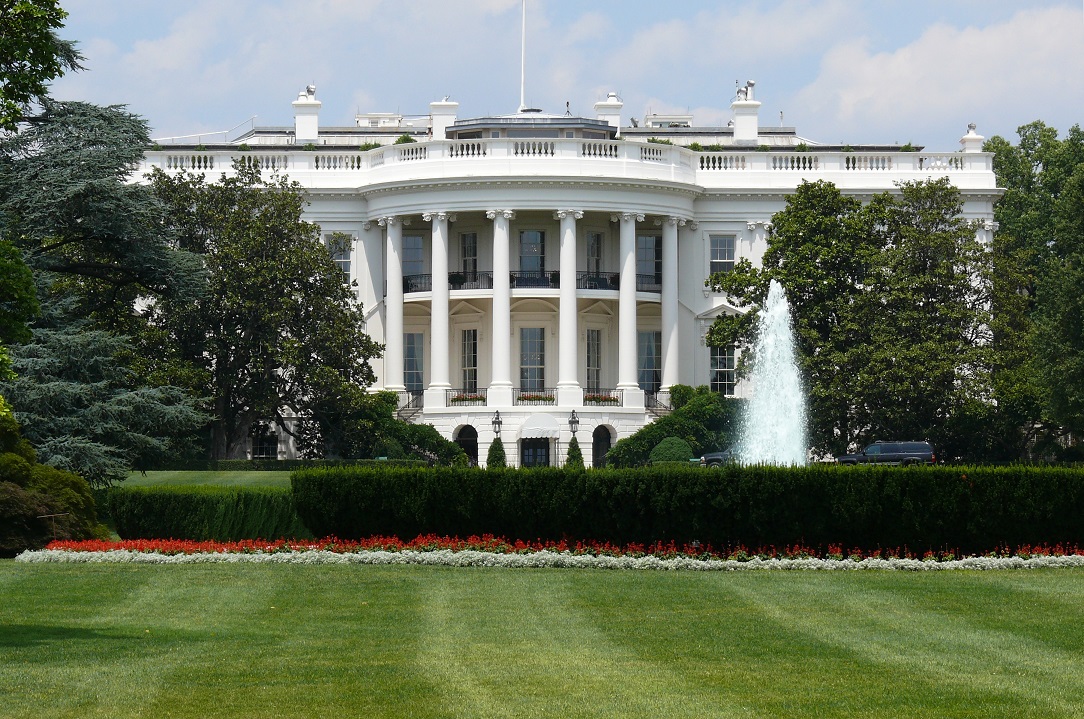White House Updates to the Travel Ban: A Summary
In the wake of the terrorist attack in London on Sept. 15, President Donald Trump tweeted:
The travel ban into the United States should be far larger, tougher and more specific-but stupidly, that would not be politically correct!

Published by The Lawfare Institute
in Cooperation With

In the wake of the terrorist attack in London on Sept. 15, President Donald Trump tweeted:
The travel ban into the United States should be far larger, tougher and more specific-but stupidly, that would not be politically correct!
— Donald J. Trump (@realDonaldTrump) September 15, 2017
On Sunday, just as the last version of the travel ban was expiring, Trump followed through to some extent; the White House announced changes to the president's travel ban with a presidential proclamation entitled “Enhancing Vetting Capabilities and Processes for Detecting Attempted Entry Into the United States by Terrorists or Other Public-Safety Threats.” The proclamation sets strict parameters on when individuals from eight nations may enter the United States. (The White House also released an FAQ and fact sheet related to this updated guidance.)
In this post, I review the specifics of the updated guidance to parse the signal from the noise. The proclamation is fairly dense and is best broken down by part:
The Review
Following Executive Order 13780—the travel ban issued in March after the January iteration was blocked by federal courts—the “Secretary of Homeland Security developed a comprehensive set of [immigration] criteria and applied it to the information-sharing practices, policies, and capabilities of foreign governments.”
Section 1 of the proclamation describes the aspired-to standards generally, though it does not detail specific best practices or procedural requirements:
i)Identity-management information. The United States expects foreign governments to provide the information needed to determine whether individuals seeking benefits under U.S. immigration laws are who they claim to be. . . .
ii)National security and public-safety information. The United States expects foreign governments to provide information about whether persons who seek entry to this country pose national security or public-safety risks. . . .
iii)National security and public-safety risk assessment. . . . The criteria assessed in this category include whether the country is a known or potential terrorist safe haven, whether it is a participant in the Visa Waiver Program established under section 217 of the [Immigration and Nationality Act], 8 U.S.C. 1187, that meets all of its requirements, and whether it regularly fails to receive its nationals subject to final orders of removal from the United States.
The descriptions detail categorical norms rather than black-and-white lines, though the gist of each category is quite apparent.
The Department of Homeland Security created a baseline for each nation to meet, then “measured each country’s performance” against it. Sixteen countries were found to be deficient, with 31 others found to be “at risk” of becoming deficient. “The Secretary of State thereafter engaged with the countries reviewed in an effort to address deficiencies and achieve improvements,” which resulted in what the administration found to be sufficient improvement. Ultimately, the secretary of homeland security concluded that “a small number of countries”—seven—remained deficient despite the government’s engagement: Chad, Iran, Libya, North Korea, Syria, Venezuela and Yemen. The president accepted the secretary’s submission of all seven.
The president noted the conspicuous absence of Iraq from this list given its obvious risk, stating that the “Secretary of Homeland Security recommends, however, that nationals of Iraq who seek to enter the United States be subject to additional scrutiny to determine if they pose risks to the national security or public safety of the United States.” But because of the unique relationship between our countries and “Iraq’s commitment to combating the Islamic State of Iraq and Syria (ISIS),” it would not be among the countries given detailed immigration strictures in the proclamation. The prior executive order on immigration similarly exempted Iraq.
Country-by-Country Details
- Chad, Libya, Yemen and Venezuela:
Citizens of Chad, Libya and Yemen may not enter as immigrants or as non-immigrants on business (B-1), tourist (B-2) and business/tourist (B-1/B-2) visas.
The same restrictions hold for “officials of government agencies of Venezuela involved in screening and vetting procedures—including the Ministry of the Popular Power for Interior, Justice and Peace; the Administrative Service of Identification, Migration and Immigration; the Scientific, Penal and Criminal Investigation Service Corps; the Bolivarian National Intelligence Service; and the Ministry of the Popular Power for Foreign Relations -- and their immediate family members.” All other Venezuelans “should be subject to appropriate additional measures to ensure traveler information remains current.”
- Iran
Iranian nationals cannot enter the U.S. as immigrants and non-immigrants save for those admitted “under valid student (F and M) and exchange visitor (J) visas[.] [S]uch individuals should be subject to enhanced screening and vetting requirements.”
- North Korea and Syria
Both of these countries were cited as “uncooperative” in fighting terrorism. All North Korean and Syrian nationals are barred entry as immigrants and non-immigrants alike.
- Somalia
Somalia was the unique case. Despite having met the standard practices laid out—so it was not one of the original seven cited for substandard practices—Somalia was included on this list because it “has significant identity-management deficiencies” and because a “persistent terrorist threat also emanates from Somalia’s territory” because of its “lack of territorial control.” No Somali nationals can enter the United States.
- Sudan
Sudan was named in the original travel ban but has been removed. Sudanese immigrants and non-immigrants alike can enter the country unrestricted.
Notably, the proclamation does not aim to revoke currently issued visas.
Scope
The guidance will impact only those foreign nationals outside the United States who do not have or qualify for a valid visa at the moment. The proclamation also notes several categorical exceptions:
- Lawful permanent residents;
- Foreign national who is admitted to or paroled into the United States by the effective date;
- Those with valid visas or “who ha[ve] a document other than a visa—such as a transportation letter, an appropriate boarding foil, or an advance parole document—valid” by the effective date;
- Dual citizens traveling using their passport from an unrestricted country;
- Foreign nationals traveling on a diplomatic visa; NATO visa; C-2 visa for travel to the United Nations; or G-1, G-2, G-3 or G-4 visa;
- Foreign nationals granted asylum in the U.S.;
- Anyone granted withholding of removal, advance parole or protection under the Convention Against Torture;
There are also specific procedures to grant waivers to foreign nationals who would otherwise be barred from entrance. To qualify for a waiver, the denial must create “undue hardship”; the person’s entrance cannot “pose a threat to the national security or public safety”; and the person’s entrance must be “in the national interest.” The secretaries of state and homeland security are to promulgate standards for applying these three criteria, and consular officers may make such determinations on a case-by-case basis.
Room for Subsequent Adjustments
The proclamation does not name a sunset date. As the Washington Post reported: “A senior administration official cautioned the new restrictions are not meant to last forever, but are ‘necessary and conditions-based, not time-based.’”
But that’s not to say that these rules are permanent. “Within 180 days,” it states, “and every 180 days thereafter, the Secretary of Homeland Security, in consultation with . . . appropriate heads of agencies, shall submit a report with recommendations” regarding the continued necessity of the restrictions put in place and or new restrictions that ought to be rolled out for nationals of a country not named in the proclamation. Dovetailing with the updated recommendations, the guidance charges the secretary of state and other relevant senior officials to nevertheless continue engaging with the countries named in furtherance of U.S. security interests.
Further Reporting
In addition to country-specific provisions, the proclamation requires the secretary of homeland security to submit “periodic reports” that:
i) Detail how the government is improving its vetting of all foreign nationals, “including through improved collection of biometric and biographic data”;
ii) Note “the scope and magnitude of fraud, errors, false information, and unverifiable claims . . . made in applications for immigration benefits under the immigration laws”;
iii) Evaluate the State Department’s procedures “related to screening and vetting . . . to enhance the safety and security of the United States.”
Effective Dates
So when does all this become effective?
For foreign nationals who were subject to the March travel ban and lack a “bona fide relationship” with someone in the United States—which includes a relationship with a U.S. relative, including a spouse, parent, child, grandparent, grandchild, fiancé, sibling, in-law, aunt/uncle, niece/nephew, or cousin, but in light of Supreme Court Justice Anthony Kennedy’s Sept. 12 administrative stay excludes “refugees covered by formal assurance,” or those sponsored by a U.S. refugee agency—the updated guidance took effect when the proclamation was ordered, so at 3 p.m. Eastern on Sept. 24. In short, this applies to individuals from Iran, Libya, Syria, Yemen and Somalia who lack a bona fide relationship.
Otherwise, the order’s effective date is “12:01 a.m. eastern daylight time on October 18, 2017.” This applies to individuals from Iran, Libya, Syria, Yemen and Somalia who have a bona fide relationship with a “person or entity in the United States” as well as all nationals of Chad, North Korea and Venezuela.
Refugees
Notably, the proclamation does not apply to would-be refugees, though updated rules regarding refugees are likely imminent. As the New York Times reports:
People seeking access to the United States as refugees are not covered by the proclamation, officials said. Entry of refugees is currently limited by the president’s original travel ban, and officials said the administration was preparing new rules for refugees that should be announced within days.


.png?sfvrsn=48e6afb0_5)


